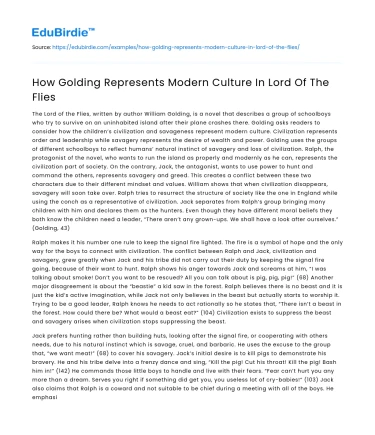The Lord of the Flies, written by author William Golding, is a novel that describes a group of schoolboys who try to survive on an uninhabited island after their plane crashes there. Golding asks readers to consider how the children’s civilization and savageness represent modern culture. Civilization represents order and leadership while savagery represents the desire of wealth and power. Golding uses the groups of different schoolboys to reflect humans’ natural instinct of savagery and loss of civilization. Ralph, the protagonist of the novel, who wants to run the island as properly and modernly as he can, represents the civilization part of society. On the contrary, Jack, the antagonist, wants to use power to hunt and command the others, represents savagery and greed. This creates a conflict between these two characters due to their different mindset and values. William shows that when civilization disappears, savagery will soon take over. Ralph tries to resurrect the structure of society like the one in England while using the conch as a representative of civilization. Jack separates from Ralph’s group bringing many children with him and declares them as the hunters. Even though they have different moral beliefs they both know the children need a leader, “There aren’t any grown-ups. We shall have a look after ourselves.” (Golding, 43)
Ralph makes it his number one rule to keep the signal fire lighted. The fire is a symbol of hope and the only way for the boys to connect with civilization. The conflict between Ralph and Jack, civilization and savagery, grew greatly when Jack and his tribe did not carry out their duty by keeping the signal fire going, because of their want to hunt. Ralph shows his anger towards Jack and screams at him, “I was talking about smoke! Don’t you want to be rescued? All you can talk about is pig, pig, pig!” (68) Another major disagreement is about the “beastie” a kid saw in the forest. Ralph believes there is no beast and it is just the kid’s active imagination, while Jack not only believes in the beast but actually starts to worship it. Trying to be a good leader, Ralph knows he needs to act rationally so he states that, “There isn’t a beast in the forest. How could there be? What would a beast eat?” (104) Civilization exists to suppress the beast and savagery arises when civilization stops suppressing the beast.
Save your time!
We can take care of your essay
- Proper editing and formatting
- Free revision, title page, and bibliography
- Flexible prices and money-back guarantee
Jack prefers hunting rather than building huts, looking after the signal fire, or cooperating with others needs, due to his natural instinct which is savage, cruel, and barbaric. He uses the excuse to the group that, “we want meat!” (68) to cover his savagery. Jack’s initial desire is to kill pigs to demonstrate his bravery. He and his tribe delve into a frenzy dance and sing, “Kill the pig! Cut his throat! Kill the pig! Bash him in!” (142) He commands those little boys to handle and live with their fears. “Fear can’t hurt you any more than a dream. Serves you right if something did get you, you useless lot of cry-babies!” (103) Jack also claims that Ralph is a coward and not suitable to be chief during a meeting with all of the boys. He emphasizes that if there is a beast, he and his followers will hunt it, as a way to convince the young kids that he has all of the power.
Golding expresses that government can’t control ones action and thinking because there always will be a driving force inside human psyche which turns them back top the primal state, also known as savagery. This is reflected by the boys’ new look, “...hair much too long, tangled here and there, knotted round a dead leaf or twig; clothes, worn away, stiff like his own with sweat, put on, not for decorum or comfort but out of custom; the skin of the body scurfy with brine.” (136) One day when Piggy, Ralph, and what is left of his tribe are going to Jack’s tribe to retrieve Piggy’s glasses. A member of Jack’s group drops a boulder onto Piggy who happens to be carrying the conch. “The rock struck Piggy a glancing blow from chin to knee; the conch exploded into a thousand white fragments and ceased to exist.” (222) This represents the marking point of the final decent into savagery. The reason Golding chooses a group of young boys to represent the battle between civilization and savagery is because their minds haven’t fully developed, so they are a basic human model. Hence a system is put in place to lead humans to do the moral and civilized thing, but at the same time can’t fully control them due to their primal psyche.






 Stuck on your essay?
Stuck on your essay?

